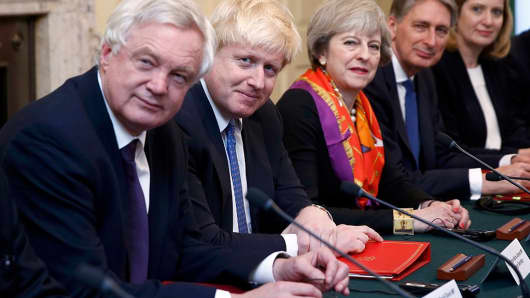<!– –>
Days of dramatic confrontations and inconsistent messaging from the U.K. government have caused many analysts to question whether the country’s leaders are ready to face the looming challenge of Brexit.
Wednesday was a bruising day for prime minister Theresa May’s governing Conservative party as finance minister, Philip Hammond, was forced into a humiliating retreat on a key budget proposal. Meanwhile Brexit secretary David Davis, who’s leading the U.K.’s negotiations with Brussels, admitted the party had carried out insufficient planning to date for the event of a “no-deal” outcome with the European Union (EU) following Brexit.
During an animated parliamentary questions session, Davis revealed a number of problems that could arise if the U.K. and EU fail to reach an agreement on a post-Brexit economic and social relationship. These would include the imposition of both tariff and non-tariff barriers on EU-bound U.K. exports; the loss of “passporting” rights, which allow U.K. financial services firms to operate throughout the union; withdrawal from the EU/U.S. open skies aviation agreement and the politically sensitive reinstatement of customs borders between the U.K.’s Northern Ireland and the republican south of the country.
The Brexit secretary referred to his previous career as a businessman when he said, “you often knew what was a good deal even though you didn’t have the numbers,” in a comment which comforted few members of the parliamentary hearing as he faced vocal outcries over his acknowledgement that the government had not yet prepared a satisfactory economic assessment of the consequences of leaving the EU without a deal.
Inconsistent messaging over how dire a failed Brexit deal could be for the U.K. saw foreign secretary Boris Johnson’s view that it would be “perfectly ok” contradicted by trade secretary Liam Fox’s opinion that it would be “bad” and prime minister May’s equivocal statement that “no deal would be better than a bad deal”.
The shadow Brexit secretary from the U.K.’s leading opposition Labour party, Keir Starmer, slammed Davis’s remarks in a statement saying, “The government is recklessly talking up the idea of crashing out of the EU with no deal…What’s clear, from the Confederation of British Industries and others, is that there is no result that would be worse for the British economy than leaving with no deal; no deal would be the worst possible deal.”
“The government should rule out this dangerous and counter-productive threat before Article 50 is triggered.”
U-turn over key tax measure
Meanwhile, Hammond backed down on a proposal announced in last week’s budget update to increase national insurance contributions – a tax on income which goes towards supporting the health and welfare state – for the self-employed after a spiky backlash from both parliamentarians and the public who claimed the hike represented a breach of his party’s election manifesto promise.
Hammond maintained that the proposal did not constitute a legal breach but did break the ‘spirit’ of the manifesto commitment – an assertion behind which the prime minister notably failed to throw her support.
Subsequent leaks from within the inner government circle suggest the Chancellor had been forced by the prime minister to unwind the proposal. This has been seen in some quarters of the U.K. media as a disempowering slight to Hammond’s autonomy and throwing into question his ability to hold on to his role. To counter such rumors, May’s aides later announced that he retained her “full confidence”.
Waiting…waiting…waiting
And this potentially among the lesser of May’s concerns this week as the parliamentary victory that she secured on Monday – enabling her to trigger Article 50 to begin the Brexit process without any conditions – had its shine removed by Scottish First Minister Nicola Sturgeon’s announcement that she would seek to launch a new referendum regarding Scotland’s independence from the U.K. within the next two years.
After heightened levels of buzz last weekend pointed to the prime minister hoping to trigger Article 50 as soon as Tuesday of this week, it is widely speculated that the Scottish news – in addition to the political limelight-stealing events of Dutch elections and the anniversary of the EU’s Rome treaty – has now compelled her to wait until the final week of March.
After a tumultuous few days, if the ruling party had hoped for a quieter Thursday, it was to be disappointed as it awoke to news of a £70,000 ($85,883) fine from the electoral watchdog – said to be the largest ever given to a U.K. political party – for misreporting election spending.
All at sea? Fears the UK government is veering off-course as it hurtles towards Brexit – CNBC



